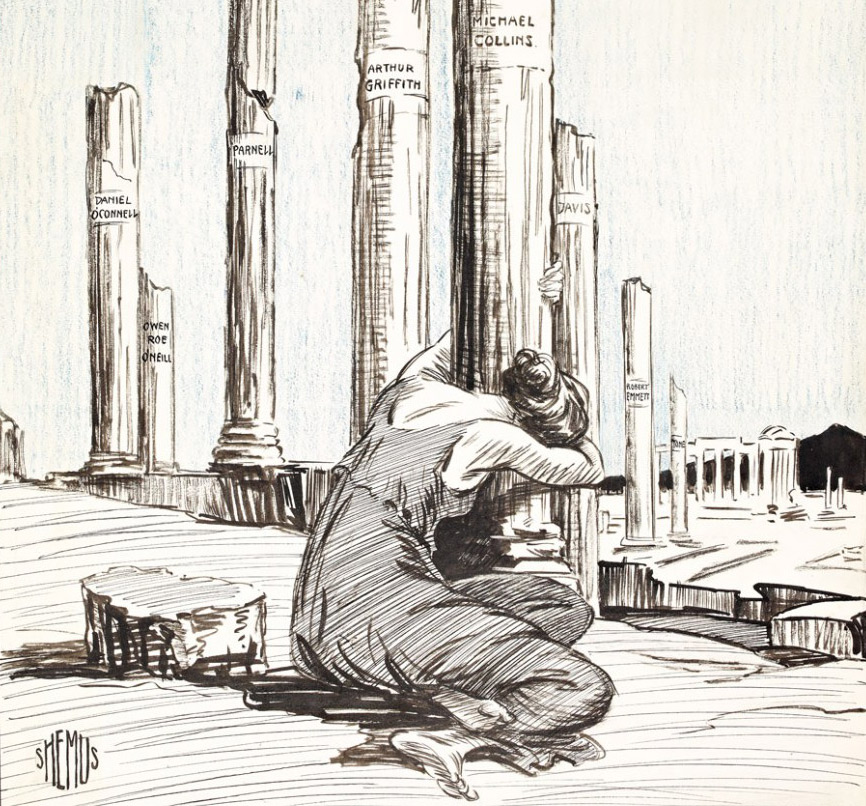Collins loss the ‘greatest blow’ to Ireland in ‘all her sad history’
Place 26 August 1922 – The death of Michael Collins is the ‘greatest blow that Ireland has sustained in all her sad history’, according to the Kerry TD, Piaras Béaslaí.
Mr Béaslaí, an ardent supporter of the Anglo-Irish Treaty, has paid homage to Collins in an article in An t-Óglach, the army’s official newspaper, in which he contrasted Mr Collins’s single-minded devotion to Ireland with his anti-treaty opponents’ misguided passions and selfishness:
‘Where they thought of their petty jealousies and vanities, their formulas and face-saving, he thought of Ireland. He knew and loved the plain people of Ireland; he was at home with the coal-heaver of the Coombe and the Carberry fisherman, for he knew that these men were Ireland. No army ever had a chief who had so fine an appreciation of the men under his command.’
The Irish Times has editorialised that Collins’s death has cast a ‘heavy gloom over the Irish nation’. While the paper claimed that it was too early to ascertain its full meaning for the country, the manner of his death was described as ‘peculiarly tragic’.
‘For two years he escaped the vigilance of the British forces with almost uncanny success. His name became a legend in the land, and the stories of his daring exploits were told at every cottage fire in Ireland. He died, as he would have wished to die, fighting; but the men at whose hands he fell were those to whom, little more than twelve months ago, he was an idolised leader. He fell within a few miles of the cottage in which he was born, leading his little party of devoted followers in action against fearful odds.’
No man did more than Michael Collins to save Ireland from civil war, the Irish Times continued, and when ‘the history of modern Ireland comes to be written the name of Michael Collins will find a prominent place in its pages.’

Soldier standing guard next to Michael Collins' body in Shanakiel Hospital (Image: National Library of Ireland)
The British Prime Minister, David Lloyd George, reacted to news of events in Cork by describing Mr Collins as a ‘gallant young Irishman’ who had been felled by a ‘treacherous blow delivered when he was engaged in endeavouring to restore ordered liberty to his country, which stands sadly in need of it. His engaging personality won friendships even amongst those who first met him as foes, and to all who met him the news of his death comes as a personal sorrow.’
Winston Churchill, who, alongside Lloyd George, was a member of the British team that negotiated the Anglo-Irish Treaty with Mr Collins sent a message of condolence to W.T. Cosgrave, now the acting head of the provisional government. In it, he remarked upon Collins’s courage and said that his ‘energy and his vision marked him as a leader of his fellow-countrymen.’ The ‘double loss’ of Collins and Arthur Griffith, he added, was a ‘heavy blow to the Irish National Government, struggling for the life, freedom and unity of Ireland amid so many difficulties.’
As well as prominent British ministers and other foreign representatives, the death of Mr Collins has drawn responses from leading members of the Catholic hierarchy, various Irish public bodies and Irish associations at home and abroad.
News of the killing has been making headlines across the world and has drawn a strong reaction among some prominent figures in Irish-American political circles. Martin H. Glynn, former Governor of New York, said that the men responsible for the slaying of the commander in chief had blackened the name of Ireland and caused injury to the Irish race all over the world.
The Governor of Ohio, James M. Cox, said that Collins was a great loss to the world because of his importance in Irish politics. Before the deaths of Griffith and Collins, Governor Cox said, the Irish question was regarded as being closed in America.
Governor Cox is currently staying in London and had been due to meet both Arthur Griffith and Michael Collins in Dublin this week.
Pathé newsreel footage titled "IN MEMORY OF MICHAEL COLLINS - SOLDIER STATESMAN - AND A MAN."
[Editor's note: This is an article from Century Ireland, a fortnightly online newspaper, written from the perspective of a journalist 100 years ago, based on news reports of the time.]





















